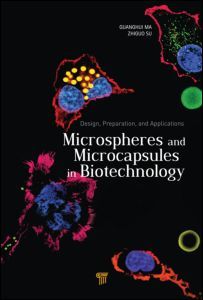Microspheres and Microcapsules in Biotechnology Design, Preparation and Applications
Coordonnateurs : Ma Guanghui, Su Zhi-Guo

Microspheres and microcapsules have very broad applications in various fields, especially in those of biotechnology and biopharmaceuticals, as targeting drug?delivery carriers, separation media for protein, peptide, DNA, and so forth. It is a big challenge to design and prepare microspheres and microcapsules of different sizes and structures from various materials and develop new techniques.
This book focuses on new microspheres and microcapsules specifically designed and prepared for application in the fields of biotechnology and biopharmaceuticals involving bioreaction, bioseparation, bioformulation, biodetection, and other new bioapplications. It provides a deep knowledge about the principles of design, preparation methods, and application results of new microspheres and microcapsules for each bioapplication area. The book also presents problems that need to be studied further and comments on the future prospects of microspheres and microcapsules.
Microspheres for Enzyme Immobilization. Microspheres for Cell Culture. Microcapsules for Cell Transplantation: Design, Preparation and Application. Microspheres for the Separation and Refolding of Proteins with an Emphasis on Particles Made of Agarose. Microspheres for Separation of Bioactive Small Molecules. Microspheres for Separation of PEG-modified Biomolecules. Microspheres for Solid Phase Organic Synthesis. Microspheres for Solid-phase Modification of Proteins. Microspheres and Microcapsules for Protein Drug Delivery. Micro/nanopheres for Gene Drug Delivery. Microsphere for Targeting Delivery of Anti-cancer Drug. Microsphere for Targeting Delivery to Brain
Nano/microsphere in Bioimaging and Medical Diagnosis. Design, Preparation and Application of Affinity Latex For Diagnosis and Bioassay.
Guanghui Ma received her Bachelor’s degree in polymer engineering at Gunma University, Gunma, Japan, in 1988. She obtained her MSc in 1990 and PhD degree in 1993 in polymer chemistry from Tokyo Institute of Technology, Japan. After a year as a research fellow at Tokyo Institute of Technology, she was appointed assistant professor in the Department of Chemical Engineering, Tokyo University of Agriculture and Technology, Japan, in 1994, and assistant professor in the Graduate School of Bio-Applications and Systems Engineering, Tokyo University of Agriculture and Technology in 1996. In 2001, she was appointed professor at the Institute of Process Engineering (IPE), Chinese Academy of Sciences, Beijing, China. Currently she is the vice president of IPE , director of the National Engineering Research Center for Biotechnology (Beijing), and editorial board member of Journal of Microencapsulation and Particuology.
Prof. Ma’s research interest includes biomaterials and bioformulations. Her expertise lies in the preparation of uniform-sized and structure-controllable microspheres and microcapsules for bioseparation media, controlled release carriers, enzyme immobilization and vaccine adjuvants, with 150 peer-reviewed papers in international journals, 6 English and 3 Chinese scientific books, and a number of book chapters. She also has more than 20 patents and collaborations with industry for technology applications. She received several awards in science and technology, including Science and Technology Prize 2005 of Beijing, National Technological Invention Prize 2009 of China, and Asian Regional Young Women Researcher Award 2009 from TWAS-TWOWS-SCOPUS.
Professor Zhiguo Su received his bachelor’s degree in chemical engineering from Dalian University of Technology (DUT), Dalian, China, in 1982 and PhD in biochemical engineering from the University of Manchester, England, in 1985. After a year as a postdoctoral fellow at Delft U
Date de parution : 01-2013
Ouvrage de 450 p.
15.6x23.4 cm
Disponible chez l'éditeur (délai d'approvisionnement : 15 jours).
Prix indicatif 232,80 €
Ajouter au panierThèmes de Microspheres and Microcapsules in Biotechnology :
Mots-clés :
American Chemical Society; DEAE Sepharose Fast Flow; Microspheres and microcapsules; Porous Microspheres; biotechnology and biopharmaceuticals; Transfection Efficiency; bio-reaction; bio-separation; and bio-formulation; Polymeric Micelles; materials science and biotechnology; PEGylated Proteins; drug–delivery carriers; Delivery Systems; DNA Vaccine; Gene Delivery; Plasmid DNA; SPG; Sepharose Ff; SP Sepharose Ff; Solid Phase Synthesis; RVG Peptide; DNA Complex; Microcarrier Culture; Peg Chain; PLGA Microsphere; DNA NPs; Magnetic Polymer Microspheres; Porous PLGA Microsphere; Solid Phase Peptide Synthesis; Macroporous Microcarriers; SPOS



